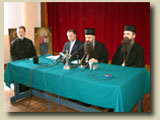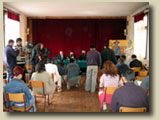|
|
Information
Service of
the Serbian Orthodox Church
April 16,
2005

WE
TESTIFIED ABOUT THE SUFFERING
OF THE CHURCH AND THE PEOPLE
 The
delegation of the Holy Synod of Bishops of the Serbian Orthodox
Church, which just returned from an extended visit to the United
States of America, held a press conference today (Saturday, April
16, 2005) in the Belgrade Patriarchate. The
delegation of the Holy Synod of Bishops of the Serbian Orthodox
Church, which just returned from an extended visit to the United
States of America, held a press conference today (Saturday, April
16, 2005) in the Belgrade Patriarchate.
His
Grace Bishop Grigorije of Zahumlje and Herzegovina, the head of
the delegation, which also included His Grace Bishop Teodosije
of Lipljan, Hieromonk Irinej Dobrijevic, Prof. Bogoljub Sijakovic,
Andy Verich, and Monk Jezekilj Stakic, provided detailed information
about the visit.
At
a meeting with UN secretary general Kofi Annan on March 28, the
Serbian Orthodox Church delegation proposed the active cooperation
of the Church in all processes that can help Kosovo and Metohija
to once again become a multiethnic and multireligious region.
The secretary general gave his strong support to the Serbian Orthodox
Church's intentions in this respect, recalling the constructive
role of the church in supporting the development of democracy
in Serbia. This willingness of the Church was also emphasized
at all other meetings with officials and church leaders. For years
the Church called for dialogue and forgiveness during the serious
trials of wars in Croatia, Bosnia and Herzegovina and Kosovo but
its voice was not heard loudly enough. Bishops Grigorije and Teodosije
on numerous occasions expressed the clear position that the Church
should lead in every dialogue where the goal is the survival of
the Church and people in crisis regions.
 The
Serbian Orthodox Church delegation also expressed willingness
to cooperate in the area of better understanding and tolerance
among religious communities. In this it received the clear support
of leading Orthodox hierarchs in the USA: Archbishop Demetrios
of the Greek Orthodox Church and Archbishop Herman of the Orthodox
Church of America, as well as Serbian Orthodox Bishop Mitrofan
of Eastern America, and Bishop Longin of the Metropolitanate of
New Gracanica in American and Canada, who contributed significantly
to the organization of the visit. The Serbian Orthodox Church's
intention of furthering dialogue between religious communities
in Kosovo and Metohija was also supported by Rabbi Arthur Schneier,
the respected leader of the Appeal of Conscience Foundation, and
representatives of the World Conference of Religions for Peace
in New York. Rabbi Schneier used the opportunity to thank the
Serbian Orthodox Church and Patriarch Pavle for their consistent
friendly relations toward the Jewish community in Belgrade and
Serbia, and their condemnation of anti-Semitic incidents. It was
decided to organize an inter-confessional conference in the Pec
Patriarchate as soon as possible, which is expected to encourage
dialogue and reconciliation toward the goal of peaceful common
life of citizens of different faiths, while at the same time testifying
to the position of the Church and people in Kosovo and Metohija. The
Serbian Orthodox Church delegation also expressed willingness
to cooperate in the area of better understanding and tolerance
among religious communities. In this it received the clear support
of leading Orthodox hierarchs in the USA: Archbishop Demetrios
of the Greek Orthodox Church and Archbishop Herman of the Orthodox
Church of America, as well as Serbian Orthodox Bishop Mitrofan
of Eastern America, and Bishop Longin of the Metropolitanate of
New Gracanica in American and Canada, who contributed significantly
to the organization of the visit. The Serbian Orthodox Church's
intention of furthering dialogue between religious communities
in Kosovo and Metohija was also supported by Rabbi Arthur Schneier,
the respected leader of the Appeal of Conscience Foundation, and
representatives of the World Conference of Religions for Peace
in New York. Rabbi Schneier used the opportunity to thank the
Serbian Orthodox Church and Patriarch Pavle for their consistent
friendly relations toward the Jewish community in Belgrade and
Serbia, and their condemnation of anti-Semitic incidents. It was
decided to organize an inter-confessional conference in the Pec
Patriarchate as soon as possible, which is expected to encourage
dialogue and reconciliation toward the goal of peaceful common
life of citizens of different faiths, while at the same time testifying
to the position of the Church and people in Kosovo and Metohija.
The
visit of the Serbian Orthodox Church delegation comes at a critical
time for resolving problems in the southern Serbian province.
Among the international community there is increasing talk of
the necessity of defining the status of the Province, and the
verification of (un-)fulfilled standards has already begun. The
delegation's mission, nevertheless, was not of an everyday political
character, as the delegation stressed repeatedly in all official
meetings. "The purpose of our visit was to secure the protection
of elementary human rights for the Serbian people in Kosovo and
Metohija, to enable the return of displaced persons and the establishment
of a sustainable life for them, and to ensure the ownership of
church property and the restoration of destroyed holy sites. In
short, our purpose was the establishment of standards of democracy
and civilization for all, not to talk about the future status
of the Serbian province," emphasized Bishop Grigorije.
During
the course of its stay in Washington, D.C., the Serbian Orthodox
Church delegation held many important meetings with officials
of the U.S. State Department, the National Security Council, the
White House and both houses of Congress. A meeting with U.S. president
George Bush was also scheduled but cancelled at the last minute
due to president Bush's departure to Rome to attend the funeral
of Pope John Paul II. Nevertheless, the delegation met with president
Bush's team dealing with Balkan issues and expected to play a
key role in further developments in Kosovo and Metohija. In all
these meetings the members of the Serbian Orthodox Church delegation
presented the position that conditions must urgently be created
in Kosovo and Metohija for the security of all citizens, especially
for returnees, who should be provided with favorable economic
conditions so that their return is sustainable over the long term.
The delegation repeatedly emphasized that regardless of status
Kosovo and Metohija must be a society based on equality of all
citizens, and not an ethnically pure state where not one Serb
or member of other minority communities will remain.
Explaining
the importance of humanitarian and economic conditions for return,
Hieromonk Irinej Dobrijevic, consultant to the Holy Synod of Bishops
and until recently head of the Serbian Orthodox Church's office
in Washington, also emphasized the need to tie in returns with
the restoration of destroyed holy sites, providing immediate employment
for returnees. This proposal met with very strong support from
U.S. officials, who viewed the opportunity to realize this program
in light of the recently signed Memorandum for restoration of
Orthodox churches in Kosovo and Metohija, which explicitly states
that the restoration will be done exclusively by firms that have
already built Orthodox churches, and that the Serbian Orthodox
Church will have a leading role in the whole process. The importance
of the Memorandum is also decisive for the holding of a UNESCO
donors conference in May, when it is expected that additional
funds will be collected for the restoration of 150 Orthodox churches
and monasteries destroyed or damaged after the armed conflict
in 1999.
One
of the most important meetings of the delegation in Washington
was with Nicholas Burns. Judging by Mr. Burns' reaction, the US
administration assessed the initiative coming from the Serbian
Orthodox Church very positively, since the Church enjoys great
moral and spiritual respect among the people and is able to actively
contribute to the establishment of multiethnic dialogue and cooperation.
Positive assessments of the delegation's positions could also
be observed after the speeches of the members of the delegation
before the US Commission for International Religious Rights and
the Woodrow Wilson Center in Washington.
Speaking
before the audience in the Woodrow Wilson Center, Bishop Grigorije
explained that "a biased view exists that our Church is closed
in and conservative, that it is against everything that comes
from the West. Of course, this is simply not true; it is a part
of the propaganda promoted by some, including the same people
who attacked the Church as pro-Western and anti-Communist during
the Titoist regime. It is our intent to dispel this current false
image, and to extend the hand of cooperation and understanding
not only to the international community but also to our neighbors:
Albanians, Croats, Bosniaks, and all others who live among us
and near us."
Bishop
Teodosije, the abbot of Visoki Decani Monastery, with his direct
experience of events in Kosovo and Metohija, placed special emphasis
on the need to dedicate special attention not just to the faithful,
whose freedoms and rights must be adequately protected as part
of the decentralization process in the Province but also to long-term
protection of Orthodox holy sites, some of which are more than
600 years old. In this context, he emphasized the need regardless
of final status to regulate the rights of the monastery in the
form of a special international agreement, and thus preserve these
valuable monuments, which are a part of the Serbian and European
cultural legacy, as the guarantee of the European future of the
whole region of southeastern Europe. He also emphasized the dangerous
intent of a certain Mr. Krasniqi, an Albanian businessman living
in the US, to acquire a well of mineral water and a marble mine
located on nationalized monastery property.
Bishop
Teodosije cited concrete examples to demonstrate that the Serbian
Orthodox Church has previously had a very constructive role in
Kosovo and Metohija. The Church was the first to condemn violence,
call for reconciliation, establish cooperation with international
and local institutions, and during the war it helped members of
all ethnic and religious communities. The example of Visoki Decani
Monastery which offered sanctuary to Kosovo Albanians during the
war has been recorded by foreign media and is known to the Washington
community. "This capital is an important potential for the
Church, which in the future can play a key role in the process
of normalization of life and multiethnic reconciliation,"
emphasized Bishop Teodosije.
The
delegation presented the issue of restitution of church property,
most of which was illegally confiscated by the Communist authorities,
as an issue of special significance connected to the survival
of the Church throughout the territory of the former Yugoslavia.
US support for the restitution of church land, as well as protection
of private property owned by Serbs in Kosovo and Metohija, is
one of the key requests of the delegation, which met with the
sincere understanding of US officials. The delegation repeatedly
cited the need for the establishment of law and order, which still
not exist in Kosovo, especially for Serbs and non-Albanian communities,
as the main precondition for resolving all aforementioned issues.
In order to establish the rule of law, it is essential, the delegation
said, to first find the perpetrators of post-war crimes who remain
unpunished. The atmosphere of unpunishability directly stimulates
new violence and encourages the process that has turned Kosovo
and Metohija into an almost completely pure Albanian territory
under the international protectorate.
During
the last few days in Washington the delegation met with many members
of Congress and senators, the majority of whom have become members
of the Serbian congressional caucus: senators Vojinovich and Brownbeck,
and representatives Barton, Franks, Tancredo, Bean, Kucinich and
others. The members of the caucus expressed their sincere readiness
to work on the promotion of the positions presented by the Serbian
Orthodox Church delegation, and to more actively seek respect
for human and religious rights, the protection of churches and
monasteries, and the resolution of burning property issues. The
delegation also gained the support of the Serbian diaspora and
faithful in this respect, especially following their visit to
Chicago, where there is a large concentration of Americans of
Serbian origin.
According
to Bishop Grigorije's statement, the delegation's visit is expected
to bring significant results and greater support of the international
community for the active role of the Serbian Orthodox Church in
Kosovo and Metohija as well as in Bosnia and Herzegovina, which
US administration officials repeatedly stressed, saying that they
see the Serbian Orthodox Church as an important partner in regional
integration and encouraging the members of the delegation by promising
them they will not be alone but supported by the international
community.

[Serbian
Translation Services]

Copyright © 1999-2004 by
The Information Service of the Serbian Orthodox Church
11000 Belgrade
Kralja Petra I no.5
+381 11 3282 596
e-mail
|

